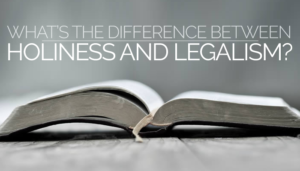Last week we began a series of blogs on the topic of holiness, and the specific application of holiness in our homes. You can review last weeks introduction here. One can listen to many conversations about holiness, watch messages or listen to sermons on holiness and rarely will you hear anyone call out certain behaviors as being holy, or certain behaviors as being unholy. I remember as a child visiting a church for a wedding, or a funeral, the occasion is not important. I remember walking down a basement hallway, with classrooms on either side. Various posters and artwork was posted on the walls of this hallway and I remember being struck by this one poster. It said “Holiness is” at the top and it had in list form underneath behaviors that were considered

holy, and behaviors that abstinence from was considered holy. Some of the highlights I remember were things like women only wearing dresses, abstaining from alcohol, modesty in jewelry and appearance, not wearing jeans, abstinence from tobacco, modesty in make-up, prayer, bible reading, etc. I remember wondering what wearing jeans or dresses had to do with holiness.
This last week I listened to a podcast called misconceptions about holiness. In this podcast Pastor Mike Fabarez of Compass Bible Church said this is what he believes is the number one misconception of holiness, “that holiness is in some ways a deprivation of what I want, that I am not going to be happy, its austere, a martyrdom of sorts.” He goes on to say that “So often it is viewed as a negative, if I am going to be holy I am going to have to give something up, I am going to suffer and not get all that I want out of life.” (Source) My friends, its this view that is derogatory to relationship and creates the construct of legalism. In the faith, following scripture (rules) with a mindset that the act of the rule following makes God pleased with us but causes us to give up something, to deprive myself of something is legalism. It simply is a war that you will loose because it it built on the premise that we have the power of self to follow the rules (scripture) in order to please God. Eventually we give that up because we never feel the result we desire, the feelings of God’s pleasure on us. It’s a standard we can never rise to, never succeed in.
I remember as a child thinking this way about the rules and standard in our home. Children oft obey in legalistic fashion. We have two distinct, typical behaviors our children exhibit towards the rules or standards of the home. The first is the “overt” obedience with the intention of receiving acceptance from the parents” You can see these behaviors obviously as they are overt, praise seeking. The second is “covert” obedience driven not from the desire for love but the fear of reprisal. I, when I was obedient, was the latter. I knew discipline would come if I got caught disobeying and discipline was not a pleasurable experience (hint, its not supposed to be either). It had its purposes and I always knew I was loved, but not fun none the less. Paul puts it this way: “Now no chastening seems to be joyful for the present, but painful; nevertheless, afterward it yields the peaceable fruit of righteousness to those who have been trained by it.” I was versed in the “painfulness” and ultimately I was trained by it.
These are the two predominant forms of obedience to household rules/standards and both are legalistic and both typically will lead to rebellion because they are ultimately narcissistic. Worse yet is we transfer these negative views of obedience towards God legalistically and pursue holiness out of one of those two motivations, wanting God to be pleased with us, or not wanting God do punish/chastise us. This is performance based identity.
Worse yet is we transfer these negative views of obedience towards God legalistically and pursue holiness out of one of those two motivations, wanting God to be pleased with us, or not wanting God do punish/chastise us. This is… Share on XThis is Legalism, NOT Holiness.
But I learned something different as I got older. Our narcissistic views are one way, towards us. Will God love me, will God be pleased with me, will God be angry with me, will God punish me. These are all focused one way, towards us. When we flip that over the other way relationally it looks somewhat different. I kind of describe it like this, in an overly simple way:
- I love my Father, and I know He loves me (Resting in Identity as son or daughter)
- My Father is for my good (Recognizing God is not withholding pleasure but guarding for our gain)
- I love my Father and I don’t want to disappoint him (not because of how He will look at me, but rather because of how I value Him)
- I love my Father and I know He loves me and because of that we want to be in each others presence (I don’t want anything to hinder or impede His presence in my life)
As parents one of the most important things we can do for our children is model a relational holiness towards God that is rooted in identity, that helps them learn how to change their view of obedience in the home to one rooted in their identity in the family, as sons and daughters, fully loved outside the confines of behavior. If not they will move forward into adulthood with the same view of obedience to God that they have towards household rules and standard, a legalistic narcissistic view devoid of relationship and identity.
Next week, in part 3 of this series I will break this relational dynamic down further so we can see more of what holiness is.

